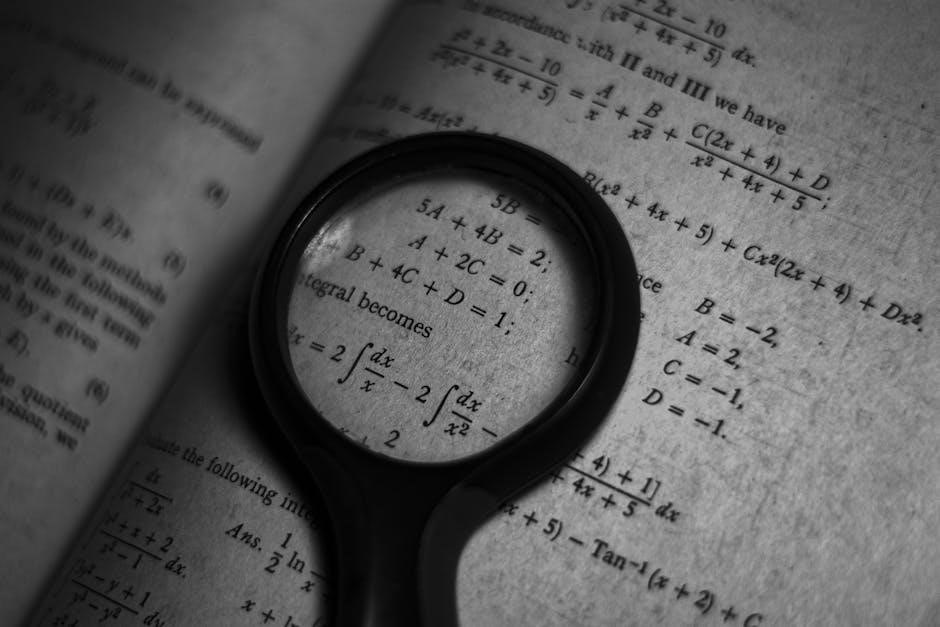algebra 2 common core pdf

Algebra 2 Common Core is a foundational course emphasizing critical thinking, problem-solving, and real-world applications. It aligns with standards fostering deep conceptual understanding and procedural fluency, supported by structured curriculum resources like PDF materials for comprehensive learning experiences.
Overview of Algebra 2 in the Common Core Curriculum
Algebra 2 in the Common Core curriculum builds on foundational math skills, focusing on linear, quadratic, and exponential relationships. It integrates functions, polynomials, and rational expressions, preparing students for advanced math. The curriculum emphasizes conceptual understanding, real-world applications, and problem-solving strategies. Structured resources, including PDF guides, support comprehensive learning, ensuring students master critical thinking and mathematical fluency.
Importance of Algebra 2 in Mathematics Education
Algebra 2 is crucial for developing problem-solving and critical thinking skills, essential for STEM careers and everyday problem-solving. It builds on foundational math concepts, connecting linear, quadratic, and exponential relationships. Mastery of Algebra 2 enhances logical reasoning, prepares students for higher-level math, and fosters a deeper understanding of real-world applications, making it a cornerstone of modern mathematics education.
Key Topics Covered in Algebra 2 Common Core
Algebra 2 covers quadratic equations, polynomials, exponential functions, and trigonometry, aligning with Common Core standards to build advanced math skills and real-world problem-solving abilities.
Quadratic Equations and Functions
Quadratic equations and functions are central to Algebra 2, focusing on solving equations of the form ax² + bx + c = 0 and analyzing parabolic graphs. Students learn factoring, completing the square, and using the quadratic formula to find roots. Graphing quadratics helps identify key features like vertex, axis of symmetry, and intercepts. Real-world applications, such as modeling projectile motion, highlight the relevance of these concepts in STEM fields and practical problem-solving.
Polynomials and Rational Expressions
Polynomials and rational expressions are explored in depth, focusing on operations like addition, subtraction, and multiplication. Simplifying rational expressions involves factoring and canceling common terms. Graphing polynomials helps identify end behavior, intercepts, and turning points. Real-world applications, such as optimization problems in engineering, demonstrate the practical relevance of mastering these concepts for advanced mathematical modeling and problem-solving in STEM fields.
Exponential and Logarithmic Functions
Exponential and logarithmic functions are central to Algebra 2, focusing on their properties, graphs, and real-world applications. Students learn to solve exponential equations using logarithms and analyze growth and decay models. Key concepts include function transformations, inverse relationships, and evaluating expressions with rational exponents. These skills are essential for advanced math and science, providing tools to model population growth, financial interest, and scientific phenomena with precision and accuracy.
Trigonometry Basics
Trigonometry basics in Algebra 2 introduce students to fundamental concepts like sine, cosine, and tangent functions. Emphasis is placed on understanding right triangle relationships and the unit circle. These concepts are applied to solve problems involving angles, waves, and periodic phenomena, preparing students for advanced math and science applications in fields such as physics and engineering.
Common Core Standards for Algebra 2
Common Core Standards for Algebra 2 focus on developing deep mathematical understanding through structured lessons and real-world applications, ensuring students master concepts like functions, polynomials, and trigonometry while building problem-solving skills and critical thinking abilities aligned with college and career readiness goals.
Structure and Emphasis of the Standards
The Common Core Standards for Algebra 2 are structured to emphasize deep conceptual understanding and procedural fluency. They focus on critical thinking and problem-solving through lessons that integrate functions, polynomials, and trigonometry. The standards highlight real-world applications, ensuring students can model and analyze situations mathematically. They also promote the use of technology, like graphing calculators, to explore and visualize concepts, fostering a comprehensive and interconnected learning experience.
Skills and Concepts Required for Mastery
Algebra 2 Common Core requires proficiency in solving quadratic equations, analyzing functions, and manipulating polynomials. Students must master exponential and logarithmic functions, as well as trigonometric concepts. Critical thinking and problem-solving skills are essential for modeling real-world scenarios. The curriculum also emphasizes the use of technology, such as graphing calculators, to explore and visualize mathematical relationships, ensuring a strong foundation for advanced mathematics and practical applications.
Resources for Learning Algebra 2 Common Core
Algebra 2 Common Core resources include textbooks and PDF materials, offering structured content for comprehensive learning. Online platforms provide additional practice, enhancing mastery of key concepts.
Recommended Textbooks and PDF Materials
Recommended Algebra 2 Common Core textbooks include Algebra and Trigonometry by James Stewart and Intermediate Algebra by Charles P. McKeague. PDF materials, such as Algebra 2 by Holt McDougal, provide comprehensive coverage of topics. These resources align with Common Core standards, offering clear explanations, practice problems, and step-by-step solutions. They are available through school libraries, online platforms, or educational websites, ensuring accessible learning for students.
Online Platforms and Tools for Practice
Popular online platforms for Algebra 2 Common Core practice include Khan Academy, Quizlet, and IXL. These tools offer interactive lessons, practice problems, and progress tracking. Khan Academy provides video tutorials and exercises, while Quizlet offers flashcards and study games. IXL features adaptive practice questions aligned with Common Core standards, ensuring targeted skill development. These resources are accessible anytime, making them ideal for self-paced learning and reinforcement of concepts.

Study Tips for Algebra 2 Success
Master Algebra 2 by understanding core concepts, practicing regularly, and applying problem-solving strategies. Use structured resources like PDF guides for focused learning and skill reinforcement.
Effective Strategies for Understanding Complex Concepts
Effective strategies for mastering complex Algebra 2 concepts include breaking problems into smaller steps, using visual aids like graphs, and collaborating with peers. Utilize resources like Common Core Algebra 2 PDFs for structured lessons and examples. Regular practice and seeking help when needed ensure a strong foundation and confidence in solving challenging problems.
Time Management and Study Habits
Effective time management and study habits are crucial for success in Algebra 2. Create a structured study schedule, setting specific goals for each session. Prioritize challenging topics early when your mind is fresh. Use resources like Algebra 2 Common Core PDFs to supplement learning. Apply active recall by self-testing and spaced repetition for better retention. Regularly review mistakes to avoid repetition and use flashcards for key terms. Stay organized with neat notes and materials. Combine these strategies for consistent progress.
Technology Integration in Algebra 2
Technology enhances Algebra 2 learning through graphing calculators, software tools, and interactive platforms, providing dynamic visualizations and explorations of mathematical concepts for deeper understanding and engagement.
Graphing Calculators and Software Tools
Graphing calculators and software tools, such as GeoGebra and Desmos, are essential for visualizing algebraic functions and exploring concepts like quadratic equations and polynomials. These tools allow students to interactively analyze graphs, understand relationships between variables, and solve complex problems dynamically. They are widely recommended in Algebra 2 Common Core resources to enhance conceptual understanding and engagement in math lessons.
Interactive Learning Platforms
Interactive learning platforms, such as Khan Academy and IXL, offer engaging resources for mastering Algebra 2 Common Core. These tools provide interactive exercises, simulations, and real-time feedback, allowing students to practice concepts like quadratic equations and polynomials at their own pace. They also include video tutorials and collaborative features, making learning dynamic and accessible for diverse learners.

Real-World Applications of Algebra 2
Algebra 2 is essential for fields like science, engineering, finance, and computer science. Concepts such as quadratic equations, exponential functions, and polynomials are applied in physics, economics, and data analysis;
Connections to Science, Engineering, and Finance
Algebra 2 concepts like quadratic equations and exponential functions are vital in physics and engineering for modeling motion and structural analysis. In finance, these tools aid in calculating compound interest, investment growth, and risk assessment. Polynomial expressions are used in chemistry for reaction rates and in computer science for algorithm design, showcasing the practical relevance of Algebra 2 in real-world problem-solving across diverse fields.
Practical Problem-Solving Skills
Algebra 2 Common Core equips students with practical problem-solving skills by applying mathematical concepts to real-world scenarios. Through solving quadratic equations, analyzing functions, and interpreting data, students develop logical thinking and analytical abilities. These skills are essential for tackling complex challenges in various fields, fostering independence and confidence in approaching mathematical and everyday problems effectively.
Assessments and Evaluations
Assessments in Algebra 2 Common Core evaluate students’ understanding of mathematical concepts and problem-solving skills, ensuring alignment with curriculum standards and guiding instruction.
Types of Assessments in Algebra 2
Algebra 2 Common Core assessments include formative, summative, and standardized tests. Formative assessments, like quizzes and classwork, monitor progress. Summative assessments, such as end-of-unit tests, evaluate mastery. Standardized tests measure broader skills, aligning with Common Core standards. Technology-enhanced questions and performance tasks are also used to gauge problem-solving and critical thinking, ensuring comprehensive evaluation of student learning outcomes.
Preparing for Standardized Tests
Preparing for Algebra 2 standardized tests involves practicing with past papers and review guides. Focus on understanding question formats and time management strategies. Utilize online resources and practice platforms to strengthen problem-solving skills. Regular review of key concepts, such as quadratic equations and functions, ensures readiness. Target weak areas through focused exercises to build confidence and accuracy for test day.

Common Challenges in Algebra 2
Algebra 2 challenges include abstract thinking, solving word problems, and retaining complex concepts like quadratic equations and functions. Many students struggle with applying theoretical knowledge to practical scenarios.
Difficulties Students Often Face
Students often struggle with abstract thinking and solving complex problems in Algebra 2. Challenges include mastering quadratic equations, understanding logarithmic functions, and applying theoretical concepts to real-world scenarios. Many find it difficult to retain procedural knowledge and transition between algebraic and graphical representations. Word problems and multi-step equations also pose significant hurdles, requiring strong analytical and organizational skills to overcome.
Strategies to Overcome Learning Barriers
Students can overcome learning barriers in Algebra 2 by breaking problems into manageable steps, using visual aids like graphs, and practicing regularly. Leveraging online platforms and educational apps provides interactive support. Collaborative learning through study groups and seeking help from teachers or tutors enhances understanding. Focusing on real-world applications and reviewing foundational concepts also build confidence and mastery of complex topics.

Differentiation and Support
Differentiation and support in Algebra 2 Common Core involve tailored accommodations for diverse learners, such as visual aids, assistive technologies, and flexible pacing, ensuring equitable access to learning.
Accommodations for Diverse Learners
Accommodations for diverse learners in Algebra 2 Common Core include visual aids, extended time, and assistive technologies. These tools help students with varying needs, such as disabilities or language barriers, to access content effectively. Modified assignments and scaffolded instruction also support differentiated learning, ensuring all students can engage with complex concepts. Additional resources, like PDF guides, provide flexible pacing and reinforce understanding for diverse learning styles.
Supplemental Resources for Advanced Students
Advanced students can benefit from supplemental resources like challenging problem sets, interactive simulations, and enrichment materials. These tools, often available as PDFs or online modules, provide deeper exploration of Algebra 2 concepts. They include advanced function analysis, complex equations, and real-world applications, allowing students to refine their skills and prepare for higher-level mathematics. Interactive platforms also offer personalized learning paths for accelerated progress.
Aligning with Common Core Standards
Algebra 2 Common Core aligns with structured standards, ensuring a comprehensive and sequential approach to mathematics education, focusing on conceptual understanding and procedural skills for student mastery.
Ensuring Curriculum Meets Standards
Ensuring the Algebra 2 curriculum aligns with Common Core standards requires careful planning and implementation. Educators use structured resources, such as PDF materials, to guide instruction and assessment. These tools emphasize conceptual understanding, procedural fluency, and real-world application, ensuring students meet the rigorous expectations outlined in the standards. Regular evaluations and adjustments help maintain alignment and maximize student mastery.
Evaluating Student Progress
Evaluating student progress in Algebra 2 Common Core involves regular assessments to track understanding and skill mastery. Teachers use formative and summative assessments, including practice exercises from PDF resources, to monitor learning. Feedback from these evaluations helps identify areas needing improvement, ensuring students grasp key concepts like quadratic equations and functions. This process aligns with Common Core standards, promoting a balanced approach to understanding and procedural fluency.
Mastering Algebra 2 Common Core requires dedication and practice, supported by resources like PDF materials. It builds essential problem-solving skills, preparing students for real-world applications and future academic challenges.
Algebra 2 Common Core focuses on quadratic equations, polynomials, exponential functions, and trigonometry. It emphasizes problem-solving strategies and real-world applications, supported by structured resources like PDF materials. The curriculum builds on foundational math skills, preparing students for advanced STEM fields and standardized tests. Effective study habits and technology tools enhance learning outcomes, ensuring mastery of complex concepts.
Final Thoughts on Mastering Algebra 2
Mastery of Algebra 2 Common Core requires consistent practice, conceptual understanding, and strategic use of resources. Emphasize problem-solving techniques, real-world connections, and technology integration for deeper learning. Regular review of quadratic functions, polynomials, and exponential concepts ensures fluency. Stay motivated, leverage PDF materials, and seek support when needed to build confidence and achieve long-term success in mathematics.



Leave a Reply
You must be logged in to post a comment.